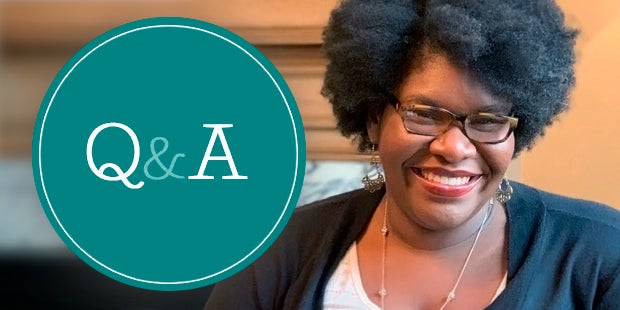Bookstores offer key support for authors, and no one knows that better than Devin Rutland, an in-house sales rep who sells books to indies across the country. Read on to learn about Rutland’s newly created role and why the author-bookstore relationship is so fundamental to bookselling.
Tell us about your role at PRH and what makes it unique.
My official title is in-house sales manager. My position has a few layers to it, first being that I’m in-house. The in-house team is made up of thirteen reps, and we differ from the field team in that we don’t typically visit our stores in person regularly—all of my communication with them is over phone, email, or video.
Layer two: I also work under the one-rep model. Many indies can have four or five reps, one for each division within PRH sales. Under one-rep, I sell all the books—adult and kids. (I am the only rep who sells both adult and children’s titles!)
Layer three: The last piece, which is also my favorite, is that I sell in primarily to Black-owned bookstores. I am the luckiest person to get to work with so many of them, including those that have been around for decades and ones that are opening their doors for the first time.
What does your relationship with booksellers look like? How do you work alongside them to ensure success on both ends?
I’ve been here for nine months so we’re still learning each other and what works and what doesn’t, and I’m so glad my booksellers work with me on this. I always tell my buyers/owners/booksellers that if they need anything or if they have thoughts about what they are reading to please use any method of communication to reach me, and I mean that wholeheartedly. I honestly do not think I’ve spoken on the phone this regularly since the ’90s/early 2000s when I would tie up my mother’s phone line for hours after homework.
Some of my stores are considerably smaller—many of them have a staff of one or two. I have to find ways to make sure they get all the information they need—but I have to do this without overwhelming them with, literally, nearly two thousand books a season. I send out galleys with their reading habits in mind, and for a number of titles I put in a handwritten note so they know this was sent with thought and consideration, and wasn’t just another piece in a mass mailing. There is so much that can be lost, so it’s important to me that they are thoroughly covered.
What do you see as the greatest opportunities as a book sales representative? Where do you foresee challenges and barriers?
Each bookstore is different. It is so interesting seeing what books the stores are drawn to that might not have all of the media attention, and there is opportunity in that because some folks are not drawn to the big seasonal titles. But that can be a challenge as well—I do see just about every Penguin Random House title that comes through a season, but the buyers see what I see multiplied many times over as they go through catalogs for all the publishers. And as I mentioned above, this is why I’ve turned to handwritten notes saying how much I love and believe in this book, or highlighting author notes that we are given, because it adds that level of personalization and hopefully the title doesn’t get lost in the shuffle.
What would you like authors to know about selling to indie bookstores?
As a former bookseller, I know that you will never have a bigger cheerleader than your local indie. According to one of my colleagues, my former bookstore decided to create a small romance section because of my efforts in handselling those titles. That section flourished and continues to do so now that I’m long gone.
There are few people more enthusiastic than a reader in love with a book (Yankees fans might be the only ones more hyped) and they will find any and every way to sell it. It’s the best feeling when those customers come back and bond with that bookseller over their love of the book. This all creates such a beautiful bond and strengthens the literary community and makes even the largest of cities feel close-knit.


